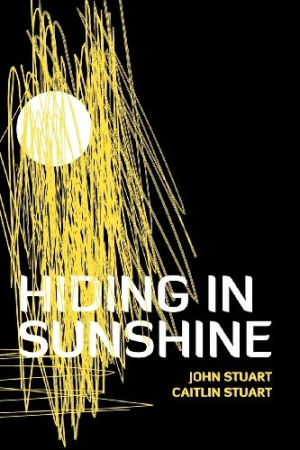Hiding in Sunshine
At a time when everyday life is fully dependent on technology, the idea of cyber warfare seems increasingly plausible. As Hiding in Sunshine’s main protagonist, Gavin Brinkley, notes, “Everyone is connected and our lives are the better for it, yet that same global connectivity is a wonderful opportunity for criminals.” Coauthors John and Caitlin Stuart weave a suspenseful and thoughtful tale around just such a premise.
Gavin and Lisa Brinkley undoubtedly have it all. Thanks to Gavin’s brilliance as a network security expert, they are wealthy and able to offer the best of everything to their two young daughters. However, their lives change drastically when they are told that a dangerous cyber-criminal network has targeted them. After moving across the country and assuming new identities, the Brinkleys hope that they will one day be free to reclaim their old lives.
As the Brinkley family becomes accustomed to their new, relatively anonymous existence, a nefarious plot against the United States is brewing in the background. It’s aimed at Internet networks, affecting everything from personal bank accounts to the stock market and national power grid. The government is unprepared for such an assault, “as 99 percent of the defense budget was still being channeled into preparations for conventional wars.” As the attacks escalate, Gavin tries to get to the bottom of them using his own extensive knowledge, in spite of the danger of exposure.
Hiding in Sunshine is an ambitious novel. The attention to detail is top-notch; the plot requires that a great deal of technological information is explored and most is described clearly enough for readers to grasp. The sheer volume of information occasionally drags down the action, however, and may be daunting for some readers.
Characterization is thorough, and the Brinkleys are likeable. Readers will empathize with the couple as they struggle to adjust to their new life and find their way back to their old one. Supporting characters are explored with depth suitable to their roles in the story, from family friends to FBI agents and the criminals responsible for the hacking attacks. The plot is compelling and maintains reader interest.
There is a tendency to tell rather than show, which results in a few instances of unnatural dialogue (characters discuss issues only for the benefit of the reader). However, for the most part, the prose is smooth and natural, as is the majority of dialogue. The story’s structure is sound, and the tale flows effectively from start to finish. There are few grammatical errors. The conclusion of the novel does include the disclosure of a subplot not previously shared with the reader, but the satisfying ending contains enough clever and unexpected moments that readers will likely overlook the belated subplot.
Hiding in Sunshine is an effectively written, engaging novel with a thought-provoking and timely plot. It’s a promising debut.
Reviewed by
Jeannine Chartier Hanscom
Disclosure: This article is not an endorsement, but a review. The publisher of this book provided free copies of the book and paid a small fee to have their book reviewed by a professional reviewer. Foreword Reviews and Clarion Reviews make no guarantee that the publisher will receive a positive review. Foreword Magazine, Inc. is disclosing this in accordance with the Federal Trade Commission’s 16 CFR, Part 255.

